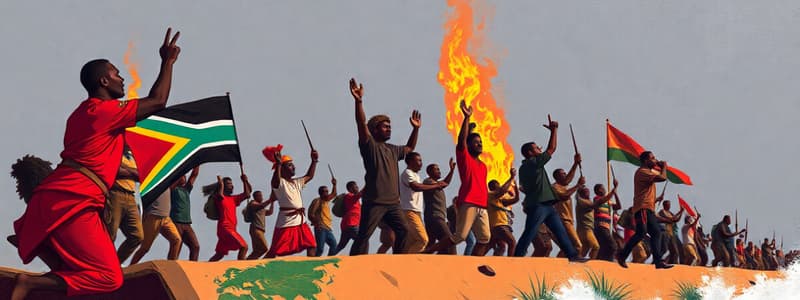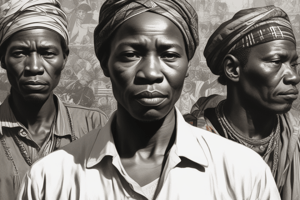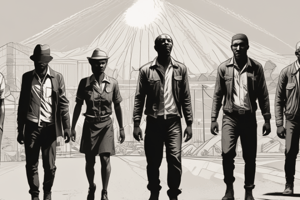Podcast
Questions and Answers
What was one of the main impacts of international movements on South Africa during the apartheid era?
What was one of the main impacts of international movements on South Africa during the apartheid era?
What did the UN declare apartheid to be?
What did the UN declare apartheid to be?
Which action did Britain take in 1963 regarding its relationship with South Africa?
Which action did Britain take in 1963 regarding its relationship with South Africa?
What was a significant event associated with the Irish anti-apartheid movement in 1984?
What was a significant event associated with the Irish anti-apartheid movement in 1984?
Signup and view all the answers
What was the response of the NP government after Botha's 'crossing the Rubicon' speech?
What was the response of the NP government after Botha's 'crossing the Rubicon' speech?
Signup and view all the answers
What was the primary objective of the Release Mandela Campaign?
What was the primary objective of the Release Mandela Campaign?
Signup and view all the answers
Which group in South Africa was notable for calling for the end of apartheid during the 1980s?
Which group in South Africa was notable for calling for the end of apartheid during the 1980s?
Signup and view all the answers
How did international anti-apartheid movements influence public opinion in Ireland?
How did international anti-apartheid movements influence public opinion in Ireland?
Signup and view all the answers
Which event prompted the United Nations to condemn apartheid as a crime against humanity?
Which event prompted the United Nations to condemn apartheid as a crime against humanity?
Signup and view all the answers
What was the primary intention behind the Comprehensive Anti-Apartheid Act of 1986?
What was the primary intention behind the Comprehensive Anti-Apartheid Act of 1986?
Signup and view all the answers
Which country showed reluctance to impose sanctions against South Africa under Margaret Thatcher's leadership?
Which country showed reluctance to impose sanctions against South Africa under Margaret Thatcher's leadership?
Signup and view all the answers
What significant condition did the South African government place on Nelson Mandela's potential release in 1985?
What significant condition did the South African government place on Nelson Mandela's potential release in 1985?
Signup and view all the answers
The Release Mandela Campaign was primarily associated with which movement?
The Release Mandela Campaign was primarily associated with which movement?
Signup and view all the answers
What was the main consequence for US companies that chose to follow anti-apartheid principles?
What was the main consequence for US companies that chose to follow anti-apartheid principles?
Signup and view all the answers
How did the momentum for sanctions against South Africa change by the late 1980s?
How did the momentum for sanctions against South Africa change by the late 1980s?
Signup and view all the answers
What was a significant resolution passed by the UN in 1963 regarding South Africa?
What was a significant resolution passed by the UN in 1963 regarding South Africa?
Signup and view all the answers
What was the primary goal of the Comprehensive Anti-Apartheid Act passed by the USA in 1986?
What was the primary goal of the Comprehensive Anti-Apartheid Act passed by the USA in 1986?
Signup and view all the answers
Which group was specifically sent to South Africa in 1985 to advocate for reform?
Which group was specifically sent to South Africa in 1985 to advocate for reform?
Signup and view all the answers
Which of the following statements best describes the impact of sanctions on South Africa's economy?
Which of the following statements best describes the impact of sanctions on South Africa's economy?
Signup and view all the answers
What was the position of the ANC and other organizations towards the implementation of sanctions?
What was the position of the ANC and other organizations towards the implementation of sanctions?
Signup and view all the answers
Which demographic group experienced the highest levels of unemployment due to economic conditions in South Africa by 1987?
Which demographic group experienced the highest levels of unemployment due to economic conditions in South Africa by 1987?
Signup and view all the answers
What type of cultural actions were taken by international artists against South Africa during the apartheid era?
What type of cultural actions were taken by international artists against South Africa during the apartheid era?
Signup and view all the answers
What was a belief held by some regarding the consequences of the sanctions imposed on South Africa?
What was a belief held by some regarding the consequences of the sanctions imposed on South Africa?
Signup and view all the answers
Which organization publicly supported cultural boycotts against South Africa in 1963?
Which organization publicly supported cultural boycotts against South Africa in 1963?
Signup and view all the answers
What was the primary reason for the academic boycott of South Africa initiated by the AAM in 1965?
What was the primary reason for the academic boycott of South Africa initiated by the AAM in 1965?
Signup and view all the answers
What significant action did US companies take regarding South African imports during the 1980s?
What significant action did US companies take regarding South African imports during the 1980s?
Signup and view all the answers
What were the Sullivan Principles intended to achieve?
What were the Sullivan Principles intended to achieve?
Signup and view all the answers
What was a key outcome of the disinvestment movement in the 1980s?
What was a key outcome of the disinvestment movement in the 1980s?
Signup and view all the answers
Why were the sanctions imposed by the UN not very successful initially?
Why were the sanctions imposed by the UN not very successful initially?
Signup and view all the answers
What motivated the 1984 ban on South African produce by the Irish government?
What motivated the 1984 ban on South African produce by the Irish government?
Signup and view all the answers
What was the impact of the economic sanctions passed by the UN in 1962?
What was the impact of the economic sanctions passed by the UN in 1962?
Signup and view all the answers
Which entity first organized a formal declaration against apartheid in South Africa among American entertainers?
Which entity first organized a formal declaration against apartheid in South Africa among American entertainers?
Signup and view all the answers
What was a significant action taken by the Irish government in 1986 regarding South Africa?
What was a significant action taken by the Irish government in 1986 regarding South Africa?
Signup and view all the answers
Which of the following best defines a 'boycott' as described in the content?
Which of the following best defines a 'boycott' as described in the content?
Signup and view all the answers
What was one of the primary successes of the Anti-Apartheid Movement highlighted?
What was one of the primary successes of the Anti-Apartheid Movement highlighted?
Signup and view all the answers
What is the distinction between a sanction and an embargo?
What is the distinction between a sanction and an embargo?
Signup and view all the answers
What was one outcome of the boycotts and sanctions against South Africa in terms of sports?
What was one outcome of the boycotts and sanctions against South Africa in terms of sports?
Signup and view all the answers
What did the Gleneagles Agreement of 1977 aim to achieve?
What did the Gleneagles Agreement of 1977 aim to achieve?
Signup and view all the answers
Which years did the UN pass resolutions against sporting ties with South Africa?
Which years did the UN pass resolutions against sporting ties with South Africa?
Signup and view all the answers
What type of sanctions did the EEC impose on South Africa in 1986?
What type of sanctions did the EEC impose on South Africa in 1986?
Signup and view all the answers
What event in 1988 significantly raised awareness for Nelson Mandela's release?
What event in 1988 significantly raised awareness for Nelson Mandela's release?
Signup and view all the answers
How did trade unions influence international action against apartheid in South Africa?
How did trade unions influence international action against apartheid in South Africa?
Signup and view all the answers
Which company's decision significantly impacted South Africa's economy in 1985?
Which company's decision significantly impacted South Africa's economy in 1985?
Signup and view all the answers
What was a consequence of the disinvestment from South Africa by international companies?
What was a consequence of the disinvestment from South Africa by international companies?
Signup and view all the answers
What effect did the sporting and cultural boycott have on South Africa?
What effect did the sporting and cultural boycott have on South Africa?
Signup and view all the answers
Which union was noted for imposing a total ban on trade between Finland and South Africa?
Which union was noted for imposing a total ban on trade between Finland and South Africa?
Signup and view all the answers
What was a major economic effect of the sanctions against South Africa?
What was a major economic effect of the sanctions against South Africa?
Signup and view all the answers
How did the campaign for Nelson Mandela's release affect public perception?
How did the campaign for Nelson Mandela's release affect public perception?
Signup and view all the answers
Which of the following was a significant result of the international response to apartheid?
Which of the following was a significant result of the international response to apartheid?
Signup and view all the answers
Study Notes
The Crisis of Apartheid in the 1980s: External International Resistance and Opposition
- International movements highlighted apartheid injustices, isolating South Africa diplomatically, culturally, and economically.
- Pressure from inside and outside South Africa forced negotiations with liberation movements.
- Business and professional delegations met with ANC leaders.
- A 'Release Mandela' campaign was launched globally.
- Afrikaans businessmen and academics called for eliminating Apartheid.
- UN described apartheid as a crime against humanity and called for sanctions.
- Sanctions and boycotts were crucial in ending Apartheid, though faced opposition.
- Failed reform attempts led to financial crisis, isolating the South African government further.
International Anti-Apartheid Movements in Britain and Ireland
- British movement founded in 1959 to discourage South African goods.
- Campaigns expanded to oppose apartheid generally.
- In 1963, the UK stopped selling arms to South Africa.
- Irish movement founded by Kader Asmal.
- Demonstrations against Springbok games and promoting a ban on sporting contacts.
- Boycott of South African fruit at Dunnes Stores supermarket.
Successes of Anti-Apartheid Movement
- Pressure on Barclays Bank and other companies to sell subsidiaries in South Africa.
- Consumer boycott of South African imports.
- Wembley Stadium concert for Nelson Mandela's release.
- Influenced movements in other European countries. British/US governments reluctant to fully support anti-apartheid movements until mid-1980s.
Boycotts and Sanctions
- Sanctions involve governments' actions restricting trade with another nation.
- Embargo is a specific type of economic sanction (i.e. restricting the import/export of an item/product from/to a country).
- Boycotts are actions by individuals/groups, not governments, and aim to refuse to support an entity (e.g. buying products).
Sports boycotts and sanctions
- South Africa banned from the Tokyo Olympic Games (1964) and the Olympics (1970).
- Anti-apartheid movement led to cancellations of Springbok rugby tours.
- Commonwealth countries, in 1977, sought to end all sporting ties with SA.
- Irish Trade Unions banned services to SA rugby teams from the 1980s.
- UN passed resolutions against sporting ties.
- Commonwealth Accord recommended sanctions from 1985.
- EEC imposed financial sanctions in 1986.
- US imposed anti-apartheid act with bans on new investments and loans to SA, and restrictions on products too.
- SAA planes restricted from flying in the USA or Australia.
Cultural Boycotts
- International artists not allowed to perform in SA, unless audiences were racially integrated.
- British Screenwriters and Actors Unions banned related work in SA.
- 60+ American entertainers signed declarations against performing in SA.
Academic Boycotts
- Academic boycott of South Africa created from 1965 onward.
- 496 university professors pledged not to accept posts in institutions enforcing racial discrimination.
- US publishers also boycotted books from SA.
Consumer Boycotts, Disinvestment, and Sanctions
- Irish refusal to handle SA products to pressure the government to ban them.
- Multiple US companies imposed boycotts regarding SA products.
- Disinvestment and divestment began in 1960s, but became crucial in the 1980s.
- Many conservatives in the US disagreed with disinvestment.
- Britain sold its Simonstown Naval base.
- Over 200 US companies cut ties with SA, resulting in a loss of US$1 billion in investment.
- UN Resolution 1761, in 1962, called for sanctions against SA (however not very successful).
- OPEC imposed oil embargo against SA in 1973.
- UN imposed arms embargo against SA in 1977.
- UN pressure increased with the Soweto Uprising and the death of Steve Biko.
Release Mandela Campaign & Consequences of International Response
- Campaign to free Mandela and release political prisoners became crucial to anti-apartheid movement.
- The release of Mandela was viewed as a litmus test.
- Pressure from international trade unions, which imposed their own boycotts and influenced their governments to place sanctions on SA.
- The consequences of international reactions (i.e. divestment and sanctions) put pressure on SA's economy.
- 500 major companies withdrew investment from SA.
- Major pressure on the South African government due to boycotts.
- Sanctions were a cause of the collapse of apartheid, forcing the government to freeze loan repayments. Increased unemployment, particularly among Black citizens, influenced the protests, among others.
Studying That Suits You
Use AI to generate personalized quizzes and flashcards to suit your learning preferences.
Related Documents
Description
This quiz explores the external international resistance and opposition to apartheid in the 1980s. It highlights the role of global movements, sanctions, and campaigns that pressured the South African government and supported liberation efforts. Learn about the impact of these movements and key events during this critical period.




